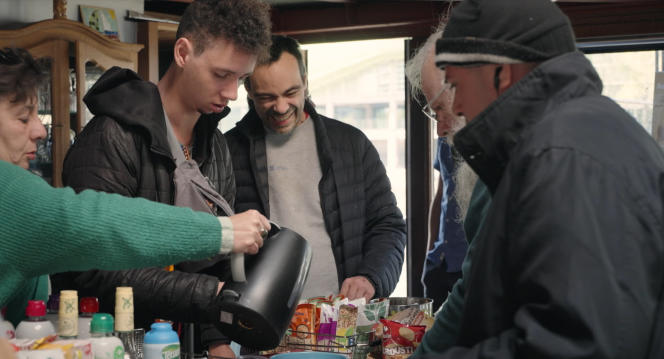THE OPINION OF THE “WORLD” – NOT TO BE MISSED
“I want to talk to you about the weapon of tomorrow. Born of the world, she will be the end of it. I want to talk to you about me, about you. I see images, colors inside. Who are not mine, who sometimes scare me. Sensations that can drive me crazy. » Thus begins this very strong film, with this verbatim version of The Human Bomb (Téléphone, 1979), as no one, not even Jean-Louis Aubert, has ever sung or heard it. It’s a man with graying close-cropped hair, a guitarist by his side in a boat cabin, dry as a cudgel, smoldering gaze, combative elocution, who interprets it here with the intensity of an unpinned grenade. Let’s remember this verse. We will quickly understand that the one who sings it as he lives it has perhaps more reasons than its creators to be tested by the explosive dispossession of oneself which is evoked there.
The boat is called The Adamant. It is found on the right bank of the Seine, near the Charles-de-Gaulle bridge and the Gare de Lyon, floating under the Quai de la Rapée, where the flow of cars from the highway dilute in Paris. Beautiful building, all in wood and openwork shutters on huge bay windows, whose vocation is obviously not to sail. It sails enough like that inside. Opened in 2010, this day center, part of the Paris Center psychiatric center, welcomes patients from the first four districts of the capital.
Free jazz session
It takes place here, discreetly, in a psychiatric environment that we know is also considerably degraded, a fight that goes back to the invention of institutional psychotherapy. Or, for the patients, but to a certain extent for the carers themselves, more freedom, more autonomy, more attention, more pleasure, more respect, more participation in community life. A place that heals because we heal the place.
No doubt Nicolas Philibert, one of our greatest documentary filmmakers, had to push the door one day, for two reasons. The first is due to a work magnetized by the expressions minority (The Land of the Deaf, To be and to Have, An animal, animals, Back to Normandy…) and whose oblique relationship to reality – poetry, unusual humour, consummate art of detour, part given to the imagination – forces us to suddenly rethink our relationship to the majority fact. The second is the echo that the motif of madness encounters in his very work, since On L‘Adamant distantly follows The least of itcarried out in 1996 at the Clinique de la Borde, a center of French institutional psychotherapy located in Sologne.
You have 53.92% of this article left to read. The following is for subscribers only.
